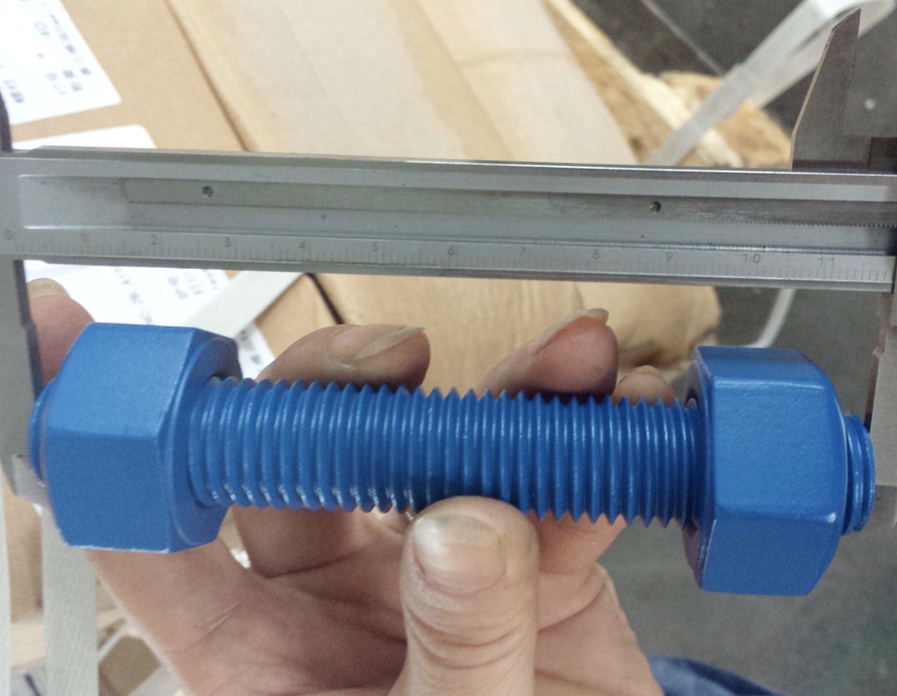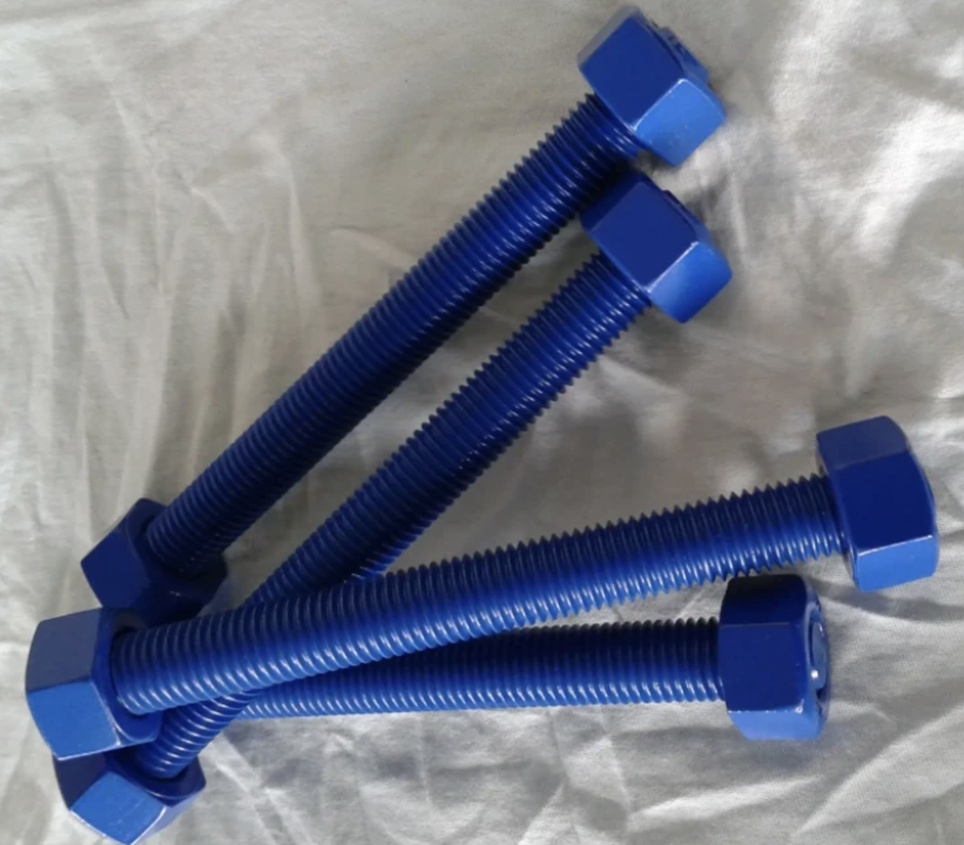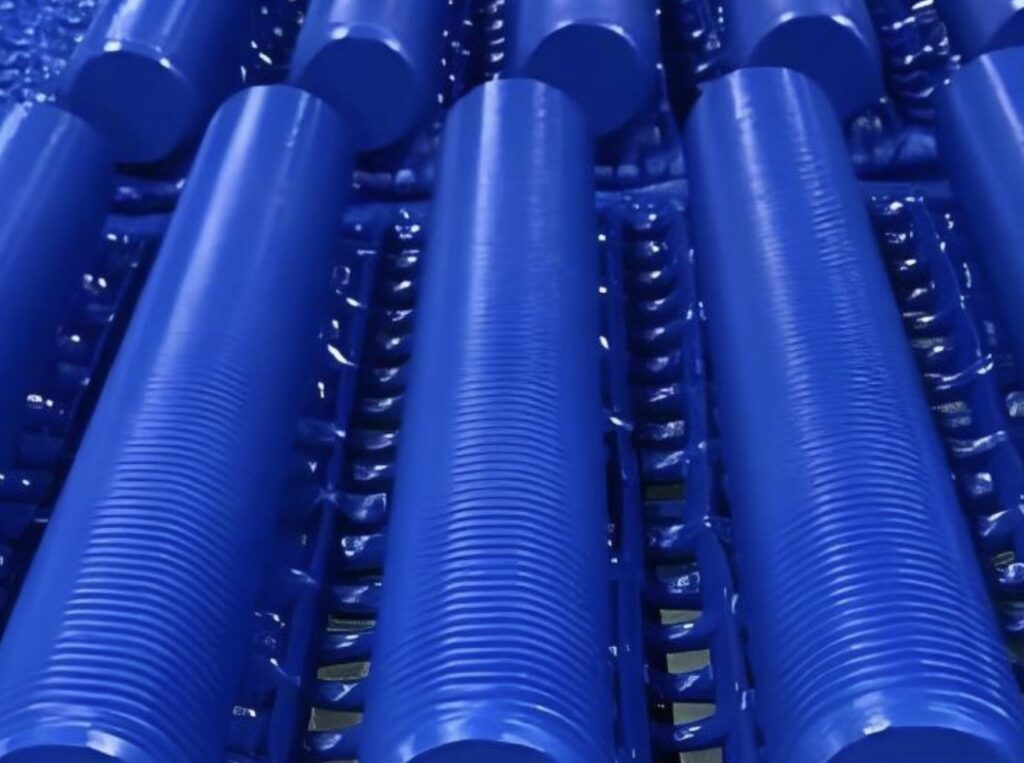What is Xylar 2?
Xylar® coatings are thin-film surface protection finishes, ideal for extending the lives of parts where environments are extremely hot, corrosive and/or abrasive. Xylar is often used on stud bolt,fasteners for high temperature and anti-rust conditions
Based on an alloy of ceramic and metallic materials, Xylar® forms a thin, hard, high-temperature-stable, sacrificial ceramic metallic barrier. In many cases, these coatings enable parts to be used in environments that would normally preclude their use. In others, they enable designers to replace expensive super alloys with less costly metal coated with Xylar®.
Xylar coatings have in common an inorganic, ceramic-metallic bonding agent rather than the organic polymer resins used in Xylan coatings. The ceramic-metallic cornerstone creates coatings which are much harder than their organic counterparts and have the potential for much higher operating temperatures, depending upon the fillers and additives selected for use in the coating. They provide exceptional thin-film corrosion protection and are often top-coated with one of the lubricated Xylan coatings. Xylar can also be used alone when a lubricated surface is not needed.
Xylar 2® is nearly twice as durable as the best organics. An inorganic ceramic-metallic coating, it is known to protect metals from high temperature oxidation and corrosive salt environments.
Due to its thin film build and extremely high corrosion resistant properties, Xylar 2 is of particularly great use as a primer for Xylan topcoats on fasteners, threaded components and other low tolerance applications.
Excellent heat resistance (up to 650⁰C) makes it an ideal solution for engine applications where the electrical couple between dissimilar metals could result in corrosion.
Xylar® coatings are recommended for using in below conditions.
- Protecting metal from oxidizing due to water in all forms (salt water, steam, ice, etc.)
- Protecting metal from high temperature oxidation up to 1000°F
- Providing a sacrificial primer for conventional air spray lubricating coatings, such as Xylan®
Xylar 2 Basecoat: a slightly different chemical composition from Xylar 1, although it remains a “cermet”. This modification produces a coating which is easier and more forgiving to apply
Xylar 101: utilizes nonmetallic fillers in combination with the basic ceramic materials. Properly applied and cured, Xylar 101 becomes a sealer for the Xylar basecoats described above and enhances the smoothness and salt-spray resistance of the basecoat formulae. The function of Xylar 101 is to inhibit the rate of sacrificial degradation
Xylar 2 +xylar 101 is a popular coating for stud bolt ,fasteners
Aluminum-filled ceramic-metallic coating Standard ASTM F1428-23
Standard Specification for Aluminum Particle-Filled Basecoat/Organic or Inorganic Topcoat, Corrosion Protective Coatings for Fasteners1
This specification covers the basic requirements for a corrosion-resistant coating consisting of an inorganic aluminum
particle-filled basecoat and an organic or inorganic topcoat, depending on the specific requirements.
1.2 The coating may be specified with basecoat only, or with the top coated with compatible organic polymer or inorganic
topcoats, depending on the specific requirements.
1.3 The basecoat is a water-dilutable slurry containing aluminum particles dispersed in a liquid binder of chromate/phosphate
compounds.
1.4 The organic topcoats consist of polymer resins and dispersed pigments and are for service where temperatures do not exceed
230°C (450°F).
1.5 The inorganic topcoats consist of ceramic oxide pigments dispersed in a liquid binder of chromate/phosphate compounds and
are for service where temperatures do not exceed 645°C (1200°F).
Coating thickness

Techinical data sheet of xylar coating
| Performance Features and Properties | Test Standard | Xylar Primer |
| Formulation | – | Ceramic |
| Corrosion Resistance | ASTM B117 | N/A |
| with Zinc Phosphate | ||
| with Zinc Plating | ||
| with Zinc-Nickel Plating | ||
| with Xylar Primer² | ||
| Coefficient of Friction³ | ASTM G99 | 0.11 – 0.13 |
| Working Temperature Range³ | – | -40 – 995°F (-40 – 535°C) |
| Dry-Film Thickness³ | ASTM D1186 | 15 – 30 µm / 0.6–1.2 mils |
| Adhesion³ | ASTM D3359 | >3B |
| Film Hardness³ | ASTM D3363 | >3H |
| Impact³ | ASTM D2794 | N/A |
Handling of Xylar Coatings
All Xylar® coatings, including Xylar 1, 2, 101 and 201 contain chromic acid as anadhesion promoter. These materials are very acidic and corrosive and also react as an oxidizer. In addition, chromic acid is a carcinogen. Therefore, special precautions must be observed when using and disposing of these materials in order to protect the application equipment and the health and safety of workers and to prevent pollution of the environment.
Want to learn more about xylar 2+xylar 101 coated stud bolt
Xylar 2 +Xylan 1070 coated stud bolt
How to select the mostsuitable xylan coating material for your applications.
Learn more about Xylan specifications? Xylan Coating Material Selections.


